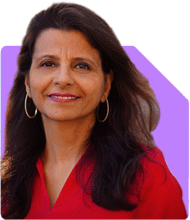Diabetic Losing Muscle: 43-Year-Old Seeking Help
Komal Jethmalani | Answer |Ask -Follow
Dietician, Diabetes Expert - Answered on Apr 28, 2024
She specialises in weight loss and diabetes management.
Jethmalani has completed her MSc in food and nutrition from SNDT University and trained at Jaslok Hospital.
She is a NDEP-certified diabetes educator.... more

I am diabetic since 5 yrs . My age is 43 yrs old . I have been losing body muscles drastically . I am very worried. No able to gauge where the problem is.
You may like to see similar questions and answers below
Dr Natasha Kumrah | Answer |Ask -Follow
GP, Diabetologist, Gastroenterologist - Answered on Mar 22, 2023
Dr Karthiyayini Mahadevan | Answer |Ask -Follow
General Physician - Answered on Jan 02, 2024
Komal Jethmalani | Answer |Ask -Follow
Dietician, Diabetes Expert - Answered on Aug 05, 2024
Nitin Narkhede |113 Answers |Ask -Follow
MF, PF Expert - Answered on Dec 15, 2025
Nitin Narkhede |113 Answers |Ask -Follow
MF, PF Expert - Answered on Dec 15, 2025
Ramalingam Kalirajan |10893 Answers |Ask -Follow
Mutual Funds, Financial Planning Expert - Answered on Dec 15, 2025
Ramalingam Kalirajan |10893 Answers |Ask -Follow
Mutual Funds, Financial Planning Expert - Answered on Dec 15, 2025
Radheshyam Zanwar |6746 Answers |Ask -Follow
MHT-CET, IIT-JEE, NEET-UG Expert - Answered on Dec 15, 2025
Ramalingam Kalirajan |10893 Answers |Ask -Follow
Mutual Funds, Financial Planning Expert - Answered on Dec 15, 2025
Ramalingam Kalirajan |10893 Answers |Ask -Follow
Mutual Funds, Financial Planning Expert - Answered on Dec 15, 2025
Ramalingam Kalirajan |10893 Answers |Ask -Follow
Mutual Funds, Financial Planning Expert - Answered on Dec 15, 2025
Samraat Jadhav |2508 Answers |Ask -Follow
Stock Market Expert - Answered on Dec 15, 2025
Ramalingam Kalirajan |10893 Answers |Ask -Follow
Mutual Funds, Financial Planning Expert - Answered on Dec 15, 2025


























